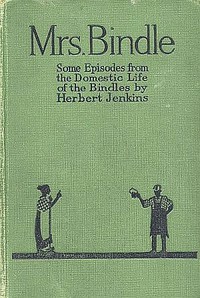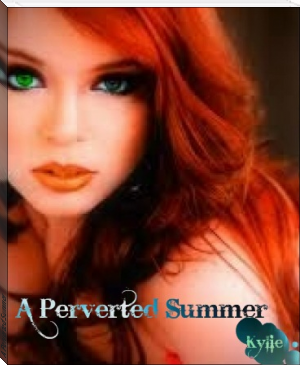Mrs. Bindle: Some Incidents from the Domestic Life of the Bindles, Jenkins [popular romance novels TXT] 📗

- Author: Jenkins
Book online «Mrs. Bindle: Some Incidents from the Domestic Life of the Bindles, Jenkins [popular romance novels TXT] 📗». Author Jenkins
Mrs. Bindle's grim silence as she moved about the kitchen disconcerted Bindle. He was busy speculating as to what was behind it all.
"Been a 'appy sort of evenin'," he remarked at length, as he proceeded to knock the ashes out of his pipe.
Mrs. Bindle made no response; but continued to gather together the plates and glasses and place them in two separate bowls in the sink.
"Seemed to enjoy theirselves," he ventured a few minutes later. "Joined in the choruses too."
Bindle's remark was like a shot fired at a waterspout, Mrs. Bindle's wrath burst its bounds and engulfed him.
"One of these days you'll kill me," she shrilled, dropping into a chair, "and then p'raps you'll be 'appy."
"Wot 'ave I done now?" he enquired.
"You've made me ashamed of you," she stormed. "You've humiliated me before all those people. What must they think, seein' me married to one who will suffer unto the third and fourth generation and——"
"But I can't——"
"You will and you know it," she cried. "Look at the men you 'ad 'ere to-night. You never been a proper 'usband to me. Here have I been toiling and[Pg 85] moiling, inching and pinching, working my fingers to the bone for you, and then you treat me like this."
Bindle began to edge almost imperceptibly towards the door.
"See how you've humiliated me," her voice began to quaver. "What will they say at the Chapel? They know all about you, whistling on Sundays and spending your time in public-houses, while your wife is working herself to skin an' bone to cook your meals and mend your clothes. What'll they say now they've seen the low companions you invite to your home? They'll see how you respect your wife."
Still Bindle made no retort; but in a subdued murmur hummed "Gospel Bells," Mrs. Bindle's favourite hymn, which he used as a snake-charmer uses a flute.
"You're glad, I know it," she continued, exasperated by his silence. "Glad to see your wife humiliated. Look at you now! You're glad." Her voice was rising hysterically. "One of these days I shall go out and never return, and then you'll be——"
Like a tornado the emotional super-storm burst, and Mrs. Bindle was in the grip of screaming hysterics.
She laughed, she cried, she exhorted, she reproached. Everything evil that had ever happened to her, or to the universe, was directly due to the blackness of Bindle's heart and the guiltiness of his conscience. He was the one barrier between her and earthly heaven. He had failed where Mr. Hearty had succeeded. She poured upon him a withering stream of invective,—and she did it at the top of her voice.[Pg 86]
At first Bindle stared; then he gazed vaguely about him. He made a sudden dive for the cupboard, rummaged about until he found the vinegar-bottle. Pouring some out into a saucer, he filled it up with water and returned to where Mrs. Bindle sat, slopping the liquid as he went.
Mrs. Bindle was now engaged in linking him up with Sodom and Gomorrah, the fate that befell Lot's wife and Dr. Crippen. Then, with a final scream, she slipped from her chair to the floor, where she lay moaning and sobbing.
With an earnest, anxious look in his eyes, Bindle knelt beside her and from the saucer proceeded to sprinkle her generously with vinegar and water, until in odour she resembled a freshly-made salad.
When he had sprinkled the greater part of the contents of the saucer on to her person, he sat back on his heels and, with grave and anxious eyes, regarded her as a boy might who has lighted the end of a rocket and waits expectantly to see the result.
Gradually the storm of emotion died down and finally ceased. He still continued to gaze fixedly at Mrs. Bindle, convinced that vinegar-and-water was the one and only cure for hysterics.
Presently, she straightened herself. She moved, then struggling up into a sitting position, she looked about her. The unaccustomed smell assailed her nostrils she sniffed sharply two or three times.
"What have you been doing?" she demanded.
"I been bringin' you to," he said, his forehead still ribbed with anxiety.[Pg 87]
"Oh! you beast, you!" she moaned, as she struggled to her feet. "You done it on purpose."
"Done wot on purpose?" he enquired.
"Poured vinegar all over me and soaked me to the skin. You've spoilt my dress. You——" and with a characteristically sudden movement, she turned and fled from the room and upstairs, banging the door with a ferocity that shook the whole house.
"Well, I'm blowed!" he muttered. "An' me thinkin' she'd like me to bring 'er round," and he slipped out into the parlour, which wore a very obvious morning-after-the-party aspect. His object was to give Mrs. Bindle an opportunity of returning. He knew her to be incapable of going to bed with her kitchen untidy.
He ate a sausage-roll and a piece of the admonitory jam-tart, listening keenly for sounds of Mrs. Bindle descending the stairs. Finally he seated himself on the stamped-plush couch and absent-mindedly lighted his pipe.
Presently he heard a soft tread upon the stairs, as if someone were endeavouring to descend without noise. He sighed his relief.
Ten minutes later he rose and stretched himself sleepily. There were obvious sounds of movement in the kitchen.
"Now if I wasn't the bloomin' coward wot I am," he remarked, as he took a final look round, "I'd light them two candles; but I ain't got the pluck."
With that he turned out the gas and closed the door.
"You take those bottles into the scullery and be[Pg 88] quick about it," was Mrs. Bindle's greeting as he entered the kitchen.
She fixed her eye on the platoon of empty beer-bottles that Bindle had assembled upon the dresser.
He paused in the act of digging into his pipe with a match-stick. He had been prepared for the tail-end of a tornado, and this slight admonitory puff surprised him.
"Well! did you hear?"
Without a word the pipe was slipped into his pocket, and picking up a brace of bottles in either hand he passed into the scullery.
As he did so a strange glint sprang into Mrs. Bindle's eyes. With a panther-like movement she dashed across to the scullery door, slammed it to and turned the key. A second later the kitchen was in darkness, and Mrs. Bindle was on her way upstairs to bed.
The continuous banging upon the scullery door as she proceeded leisurely to undress was as sweet music to her ears.
That night Bindle slept indifferently well.[Pg 89]
CHAPTER IV THE COMING OF JOSEPH THE SECOND"Why can't you drink your tea like a Christian?" Mrs. Bindle hurled the words at Bindle as if she hoped they would hit him.
He gazed at her over the edge of the saucerful of tea, which he had previously cooled by blowing noisily upon it. A moment later he proceeded to empty the saucer with a sibilant sound suggestive of relish. He then replaced it upon the table.
"Might as well be among pigs, the way you behave at table," she snapped and, as if to emphasise her own refinement in taking liquids, she lifted her cup delicately to her lips, the little finger of her right hand crooked at an awkward angle.
Bindle leaned slightly towards her, his hand to his ear. Ignoring his attitude, she replaced the cup in the saucer.
"You done that fine, Mrs. B. I didn't 'ear a sound," and he grinned in that provocative manner which always fanned the flame of her anger.
"Pity you don't learn yourself, instead of behaving as you do."
"But 'ow am I to know 'ow a Christian drinks?"[Pg 90] he demanded, harking back to Mrs. Bindle's remark. "There's 'Earty now, 'e's a Christian; but he sucks in 'is whiskers as if 'e was 'ungry."
"Oh! don't talk to me," was the impatient response, as she proceeded to pour herself out another cup of tea.
"Wotjer marry me for, then? I told you I was always chatty at breakfast."
"Don't be disgusting!" she cried angrily. He stared at her in genuine astonishment. "You know I never allowed you to say such things to me before we were married."
"Well, I'm blowed!" he muttered as he pushed across his cup that it might be refilled.
"Millie's coming this afternoon."
"Millie!" he cried, his face beaming. "She all right again?"
"Don't be disgusting," she said.
"Disgustin'," he repeated vaguely. Then understanding came to him.
Millie Dixon, n�e Hearty, had, some weeks previously, presented her husband with "a little Joe." These had been her first words to Charley Dixon when he, still partially in the grip of the terror through which he had passed, had been taken by the nurse to be introduced to his son and heir, whilst a pale, tired Millie smiled bravely up at him.
To Mrs. Bindle the very mention of the word "babies" in mixed company was an offence. The news that he was an uncle had reached Bindle from Mrs. Hearty, Mr. Hearty sharing his sister-in-law's[Pg 91] views upon reticence in such delicate and personal matters.
"She goin' to bring it with 'er?" Bindle enquired eagerly; but Mrs. Bindle, anticipating such a question, had risen and, going over to the sink, had turned on the tap, allowing the question to pass in a rushing of water.
"Funny feelin' like that about babies," he muttered as he rose from the table, his meal completed. "I suppose that's why she wouldn't let me keep rabbits."
"Charley's coming in later; he's going to mend Aunt Anne's musical-box," was Mrs. Bindle's next announcement.
Bindle whistled incredulously.
"What's the matter now?"
"You ain't goin' to trust 'im with Ole Dumb Abraham, are you?" he asked in a hushed voice.
"And why not, pray?" she challenged. "Millie says Charley is very clever at mending things, and it's never played."
Bindle said nothing. The musical-box had been left to Mrs. Bindle by "poor Aunt Anne"—Mrs. Bindle referred to all dead relatives as "poor"; it was her one unconscious blasphemy. Dumb Abraham, as Bindle called the relic, had always been the most sacred among Mrs. Bindle's household gods. It had arrived dumb, and dumb it had remained, as she would never hear of it leaving the house to be put in order.
If Bindle ever went into the parlour after dark, he was always told to be careful of Aunt Anne's musical box. Many a battle had been waged over its dumb[Pg 92] ugliness. Once he had rested for a moment upon its glassy surface a half-smoked cigar, a thoughtless act which had resulted in one of the stormiest passages of their married life.
"Well!" challenged Mrs. Bindle, as he remained silent.
"I didn't say anythink," he mumbled, picking up his cap and making for the door, thankful that it was Saturday, and that he would be home in time to see his beloved niece.
That afternoon Bindle arrived home with his pockets bulging, and several parcels of varying sizes under his arm.
"What have you got there?" demanded Mrs. Bindle, who was occupied in spreading a white cloth upon the kitchen table.
"Oh! jest a few things for 'is Nibs," was the response.
"For who?"
"The nipper," he explained, as he proceeded to unburden himself of the parcels, laying them on the dresser.
"I wish you'd try and talk like a Christian," and she banged a metal tea-tray upon the table.
Bindle ignored her remark. He was engaged in taking from its wrappings a peculiarly hideous rag-doll.
Mrs. Bindle paused in her preparations to watch the operation.
"What's that for?" she demanded aggressively.
"Millie's kid," he replied, devoting himself to the opening of other packages, and producing a monkey-[Pg 93]on-a-stick, an inexpensive teddy-bear, a jack-in-the-box and several metal animals, which on being blown through emitted strident noises.
"You ought to be ashamed of yourself, wasting money on hideous things like that. They'd frighten the poor child to death."
"Frighten 'im!" he cried. "These ain't goin' to frighten 'im. You wait an' 'ear wot 'e's got to say about 'em."
"You just clear those things out of my kitchen," was the uncompromising rejoinder. "I won't have the poor child sent into convulsions because you're a fool."
There was something in her voice which caused Bindle meekly to gather together the toys and carry them out of the kitchen and upstairs, where he placed them in a drawer devoted entirely to his own possessions.
"Well, I'm blowed," he murmured, as he laid them one beside another. "And me a-thinkin' they'd make 'im laugh;" with that he closed the drawer, determined that, at least, Millie should see the toys that were as much a tribute to her as to her offspring.
"Fancy little Millikins 'avin' a kid all of 'er own," he muttered, as he descended the stairs, "'er wot I used to dangle on my knee till she crowed again. Well, well," he added as he opened the kitchen door, "we ain't none of us gettin' younger."
"Wot's that?" enquired Mrs. Bindle.
"Merely a sort o' casual remark that none of us ain't puttin' back the clock."[Pg 94]
Mrs. Bindle sniffed disdainfully, and busied herself with preparations for tea.
"Why didn't you tell me before that Millikins was comin'?" he enquired.
"Because you're never in as any other decent husband is."
He recognised the portents and held his peace.
When Mrs.





Comments (0)